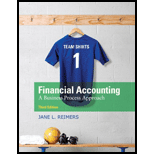
Financial Accounting
3rd Edition
ISBN: 9780133791129
Author: Jane L. Reimers
Publisher: Pearson Higher Ed
expand_more
expand_more
format_list_bulleted
Textbook Question
Chapter 2, Problem 16Q
Must a company collect the money from a sale before the sale can be recognized?
Expert Solution & Answer
Want to see the full answer?
Check out a sample textbook solution
Students have asked these similar questions
Atlas Medical Clinic has fixed costs of$260,000. After 35,000 visits, its fixed costs increase by $42,000 because it must hire additional support staff. Variable costs are $6 per visit. If you are budgeting for 30,000 visits, what is your average cost per visit?
I need the correct answer to this financial accounting problem using the standard accounting approach.
Please help me solve this financial accounting problem with the correct financial process.
Chapter 2 Solutions
Financial Accounting
Ch. 2 - Prob. 1YTCh. 2 - Prob. 2YTCh. 2 - Is prepaid insurance an expense or an asset?...Ch. 2 - Prob. 4YTCh. 2 - Give an example of the matching principle from the...Ch. 2 - What is the difference between cash basis and...Ch. 2 - Prob. 7YTCh. 2 - What is GAAP? What is IFRS?Ch. 2 - Prob. 2QCh. 2 - Prob. 3Q
Ch. 2 - Prob. 4QCh. 2 - Prob. 5QCh. 2 - What are the four basic financial statements?Ch. 2 - Which financial statement pertains to a single...Ch. 2 - Prob. 8QCh. 2 - Prob. 9QCh. 2 - Prob. 10QCh. 2 - Prob. 11QCh. 2 - Prob. 12QCh. 2 - What does recognize revenue mean in accounting?Ch. 2 - Prob. 14QCh. 2 - What is an accrual? What is a deferral?Ch. 2 - Must a company collect the money from a sale...Ch. 2 - What is the cost of goods sold?Ch. 2 - Explain the difference between cash basis...Ch. 2 - Prob. 19QCh. 2 - Prob. 20QCh. 2 - Prob. 21QCh. 2 - Prob. 1MCQCh. 2 - Prob. 2MCQCh. 2 - Prob. 3MCQCh. 2 - Prob. 4MCQCh. 2 - Prob. 5MCQCh. 2 - Prob. 6MCQCh. 2 - Prob. 7MCQCh. 2 - Prob. 8MCQCh. 2 - Prob. 9MCQCh. 2 - Prob. 10MCQCh. 2 - Elements of the financial statements. (LO 3). For...Ch. 2 - Prob. 2SEACh. 2 - Prob. 3SEACh. 2 - Prob. 4SEACh. 2 - Prob. 5SEACh. 2 - Prob. 6SEACh. 2 - Cash versus credit sales. (LO 3, 4). Company A had...Ch. 2 - Prob. 8SEACh. 2 - Prob. 9SEACh. 2 - Prob. 10SEACh. 2 - Prob. 11SEBCh. 2 - Prob. 12SEBCh. 2 - Prob. 13SEBCh. 2 - Prob. 14SEBCh. 2 - Prob. 15SEBCh. 2 - Prob. 16SEBCh. 2 - Prob. 17SEBCh. 2 - Prob. 18SEBCh. 2 - Prob. 19SEBCh. 2 - Prob. 20SEBCh. 2 - Prob. 21EACh. 2 - Prob. 22EACh. 2 - Prob. 23EACh. 2 - Balance sheet and income statement transactions....Ch. 2 - Prob. 25EACh. 2 - Prob. 26EACh. 2 - Prob. 27EACh. 2 - Prob. 28EACh. 2 - Elements of the financial statements. (LO 3). The...Ch. 2 - Prob. 30EBCh. 2 - Elements of the financial statements. (LO 3)....Ch. 2 - Prob. 32EBCh. 2 - Prob. 33EBCh. 2 - Prob. 34EBCh. 2 - Prob. 35EBCh. 2 - Current ratio. (LO 5). The following data was...Ch. 2 - Prob. 37PACh. 2 - Prob. 38PACh. 2 - Prob. 39PACh. 2 - Prob. 40PACh. 2 - Prob. 41PACh. 2 - Prob. 42PBCh. 2 - Prob. 43PBCh. 2 - Prob. 44PBCh. 2 - Prob. 45PBCh. 2 - Prob. 46PBCh. 2 - Prob. 1FSACh. 2 - Prob. 2FSACh. 2 - Prob. 3FSA
Knowledge Booster
Learn more about
Need a deep-dive on the concept behind this application? Look no further. Learn more about this topic, accounting and related others by exploring similar questions and additional content below.Similar questions
- Can you solve this general accounting problem using appropriate accounting principles?arrow_forwardI need the correct answer to this general accounting problem using the standard accounting approach.arrow_forwardKingsolver Corporation issues $2,500,000 of 7% bonds at 96. What is the amount of cash Exxon would receive from the sale? Need Answerarrow_forward
- Excelsior Brands Company uses standard costs for its manufacturing division. Standards specify 0.12 direct labor hours per unit of product. At the beginning of the year, the static budget for variable overhead costs included the following data: Production volume 7,500 units Budgeted variable overhead costs $24,500 Budgeted direct labor hours 2,100 hours At the end of the year, actual data were as follows: Production volume 6,800 units Actual variable overhead costs $23,200 Actual direct labor hours 2,040 hours How much is the standard cost per direct labor hour for variable overhead?arrow_forwardCan you help me solve this general accounting question using the correct accounting procedures?arrow_forwardPlease provide the solution to this financial accounting question with accurate financial calculations.arrow_forward
arrow_back_ios
SEE MORE QUESTIONS
arrow_forward_ios
Recommended textbooks for you
 Intermediate Accounting: Reporting And AnalysisAccountingISBN:9781337788281Author:James M. Wahlen, Jefferson P. Jones, Donald PagachPublisher:Cengage LearningCentury 21 Accounting Multicolumn JournalAccountingISBN:9781337679503Author:GilbertsonPublisher:Cengage
Intermediate Accounting: Reporting And AnalysisAccountingISBN:9781337788281Author:James M. Wahlen, Jefferson P. Jones, Donald PagachPublisher:Cengage LearningCentury 21 Accounting Multicolumn JournalAccountingISBN:9781337679503Author:GilbertsonPublisher:Cengage

Intermediate Accounting: Reporting And Analysis
Accounting
ISBN:9781337788281
Author:James M. Wahlen, Jefferson P. Jones, Donald Pagach
Publisher:Cengage Learning

Century 21 Accounting Multicolumn Journal
Accounting
ISBN:9781337679503
Author:Gilbertson
Publisher:Cengage



Revenue recognition explained; Author: The Finance Storyteller;https://www.youtube.com/watch?v=816Q6pOaGv4;License: Standard Youtube License